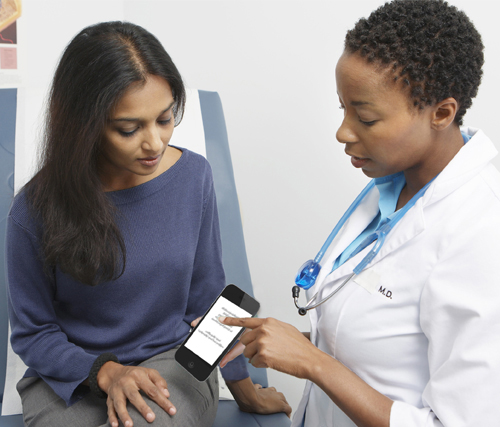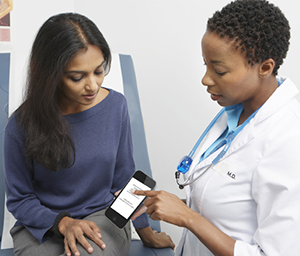Researchers apply innovative mobile technology to primary care

 Mobile technologies have become increasingly popular among ordinary people as a means for managing their everyday activities, monitoring behavioral changes, and practicing proper healthcare maintenance. With the help of new research, these innovative devices are now being used as a way to collect and analyze patient data and facilitate patient-physician communication.
Mobile technologies have become increasingly popular among ordinary people as a means for managing their everyday activities, monitoring behavioral changes, and practicing proper healthcare maintenance. With the help of new research, these innovative devices are now being used as a way to collect and analyze patient data and facilitate patient-physician communication.
Two Texas A&M Health Science Center School of Rural Public Health professors, Yan Hong, Ph.D. and Marcia Ory, Ph.D., along with several others, recently published an article online in the Journal of Medical Internet Research Mhealth and Uhealth on the use of mobile devices by primary care physicians and their patients. This particular study examined the usability of mobile devices to promote healthy behaviors and chronic disease prevention for such health issues as diabetes and obesity.

According to Dr. Hong and Dr. Ory, the past two decades have witnessed a rapid development and adoption of mobile health technologies, such as smart phones and iPods, in health promotion and health care. “As the penetration of mobile technologies into the general population continues to deepen, mobile health technology is increasingly being used as an efficient tool for patient data collection, transport, and storage.”
In “Using the iPod touch for Patient Health Behavior Assessment and Health Promotion in Primary Care,” researchers conducted a study of 109 patients on their experience using an iPod touch-based health behavior assessment (HBA) tool. Patients completed a short HBA on an iPod touch while in the waiting room, at which point the assessment report was immediately sent to the doctor and printed out. When the patients met with their doctors, they could then review the report and provide individualized recommendations for healthy behavioral change or maintenance.

Following the initial stage of the study, researchers conducted follow-up surveys to determine the effectiveness and general response from patients who used the iPod touch HBA tool. Researchers concluded that patients were able to complete the HBA on the iPod touch with ease, noting that when physicians engaged their patients on the HBA report, patients were much more likely to put into practice the behavioral changes suggested by their physicians than those who did not. This method provided patients with the opportunity to engage with their physician in a one-on-one setting, while receiving individualized healthcare suggestions that facilitate effective behavioral change.
“The vast majority of patients found the device extremely user-friendly,” said Dr. Forjuoh, the principal investigator of the project. “In addition, the iPod touch minimizes survey response error, is reliable in eliciting sensitive data in a private and confidential manner, provides easy data storage and transportation, and is a promising device to assist behavioral change within a diverse population of varying age groups, genders, ethnicities, and health status.”
Additional authors include Samuel N. Forjuoh, Dr.P.H., M.D., Ph.D., Department of Family and Community Medicine, Scott and White Healthcare; Suojin Wang, Ph.D., professor, Department of Statistics, Texas A&M University; and Jude Des Bordes, M.D., M.P.H., The University of Texas MD Anderson Cancer Center.
Media contact: media@tamu.edu


